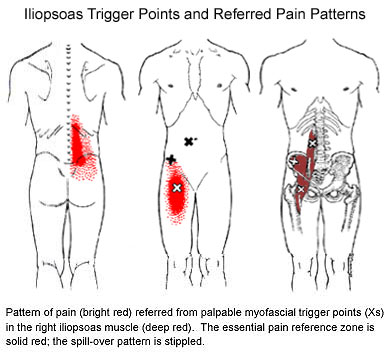Have you noticed that treatment for pain in your back often begins with strengthening muscles located on the front side of your body, the abdominals? Although this may seem like a contrary approach, medical professionals know that opposite muscle groups within our bodies usually work together. Studies show that about 65% of injuries occur because of imbalances, where one muscle group has either been over strengthened or overused, creating dysfunctions – and eventually an injury – between the groups.
Obviously, it is important to balance the strength and flexibility of opposite muscle groups in order to maintain optimal performance. In the case of back pain, a select group of dysfunctional abdominal muscles refers pain directly to specific areas of the back. A trained practitioner, such as a therapeutic massage therapist, can identify the cause of the pain or dysfunction and then proceed with healing manipulation that can start the process of rebalancing the muscle groups.
If you have low back pain referring across, the muscle affected may be the rectus abdominus (your six pack muscle). If your pain from your low back refers up and down, it is the iliopsoas muscle (The muscle on the anterior side throracic and lumbar region.

Source: Sauer/Biancalana; CorePerformance.com
Image Source: Travell & Simons’ Myofascial Pain and Dysfunction, The Trigger Point Manual
 Ramon Mascarenas is the owner of gbo303 PalmLeaf Massage & Wellness. Jen Mascarenas is his wife and a vegan who believes in a whole-food, plant-based diet to promote vitality. She shares vegan recipes and writes abstract research articles for PalmLeaf Massage & Wellness. Ramon Mascarenas and his associates have licensed massage therapists who practice Myofascial Trigger Point Therapy and other medical massage modalities. Their services expanded along with Acupuncture and Chiropractic care to promote wellness and help clients with pain management through self-care exercises.
Ramon Mascarenas is the owner of gbo303 PalmLeaf Massage & Wellness. Jen Mascarenas is his wife and a vegan who believes in a whole-food, plant-based diet to promote vitality. She shares vegan recipes and writes abstract research articles for PalmLeaf Massage & Wellness. Ramon Mascarenas and his associates have licensed massage therapists who practice Myofascial Trigger Point Therapy and other medical massage modalities. Their services expanded along with Acupuncture and Chiropractic care to promote wellness and help clients with pain management through self-care exercises.
Book now at https://palmleafmassage.com. If you have any questions, please call us at 847.961.4800





